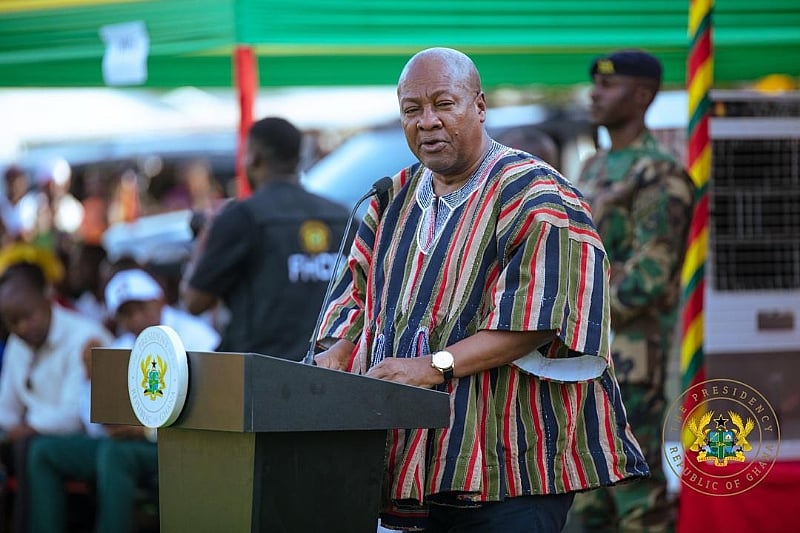Former President John Dramani Mahama, during a recent Thank-You Tour of the Bono Region, launched a pointed critique of the previous New Patriotic Party (NPP) administration, accusing them of deceptive practices in their declaration of the Sunyani Regional Hospital as a teaching hospital. Mahama argued that the NPP’s reclassification was a superficial gesture, lacking both the legal framework and the necessary infrastructural development to genuinely function as a teaching facility. He highlighted the absence of any legislative backing for the NPP’s decision, contrasting it with his own administration’s formalized approach, which included securing approval from the Council of State for the hospital’s board and establishing a collaboration with the University of Energy and Natural Resources (UENR) to initiate the training of healthcare professionals. This collaboration, Mahama emphasized, would serve the healthcare needs of the Bono, Bono East, and Ahafo regions, extending its benefits beyond immediate geographical boundaries.
Mahama’s address went beyond mere criticism of the previous government, outlining a comprehensive vision for healthcare and educational development in the region. Central to this vision is the establishment of a medical school at UENR, a project Mahama characterized as long overdue, citing the university’s historical neglect. He pledged to reverse this trend of underinvestment, framing the establishment of the medical school as a key component of his administration’s commitment to revitalizing UENR. This commitment, he explained, is underpinned by the decision to uncap the Ghana Education Trust Fund (GETFund), a move designed to release significant resources for crucial infrastructure projects across the educational sector. By uncapping GETFund, Mahama’s administration aims to provide the financial impetus needed to upgrade and expand educational facilities, including those necessary for the successful implementation of the proposed medical school at UENR.
The former president emphasized that the groundwork for the medical school is already underway, highlighting the completion of a GETFund infrastructure audit at UENR. This audit, he explained, provides a clear roadmap for the construction of facilities specifically designed to support a comprehensive medical school program. The imminent commencement of construction, following the audit’s findings, underscores Mahama’s commitment to translating promises into tangible action. He positioned these initiatives not as isolated projects but as part of a broader strategy to address systemic deficiencies and promote sustainable development within the region. This strategic approach, he argued, contrasts sharply with the NPP’s alleged penchant for superficial solutions and short-sighted policies.
Mahama’s critique of the NPP extended beyond the specific issue of the Sunyani Regional Hospital, encompassing a broader condemnation of what he characterized as the NPP’s tendency towards “shortcuts and showmanship.” He argued that the NPP’s approach to governance prioritizes superficial appearances over substantive and sustainable development. This tendency, he claimed, is evident in the NPP’s handling of the Sunyani Regional Hospital, where the declaration of its teaching hospital status lacked the necessary legal and infrastructural foundations. He presented his own administration’s approach as a stark contrast, emphasizing a commitment to meticulous planning, legal compliance, and long-term investment in essential infrastructure.
The establishment of the medical school at UENR and the uncapping of GETFund, Mahama argued, exemplify his administration’s commitment to genuine and sustainable development. These initiatives, he emphasized, are not merely about constructing buildings or making grand pronouncements; they are about investing in the future of the region, empowering its people, and building a foundation for long-term prosperity. He contrasted this approach with what he characterized as the NPP’s focus on short-term gains and superficial accomplishments, arguing that such an approach ultimately fails to address the underlying challenges facing the region and its people. By highlighting the contrast between his administration’s long-term vision and the NPP’s alleged short-sightedness, Mahama sought to solidify his party’s image as the champions of genuine progress and sustainable development.
In essence, Mahama’s Thank-You Tour of the Bono Region served as a platform to articulate a comprehensive vision for the region’s future, centered on investments in healthcare and education. He used the opportunity to draw a sharp distinction between his approach to governance and that of the previous NPP administration. He presented his administration’s plan for the Sunyani Regional Hospital and UENR as concrete examples of a commitment to thorough planning, legal compliance, and long-term investment in essential infrastructure. By contrasting this approach with what he characterized as the NPP’s tendency towards superficial gestures and short-term political maneuvering, Mahama sought to position his party as the true advocates for sustainable development and the well-being of the people of the Bono Region.


